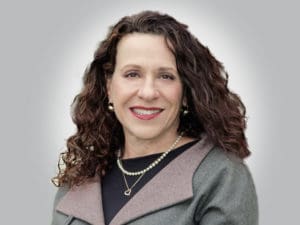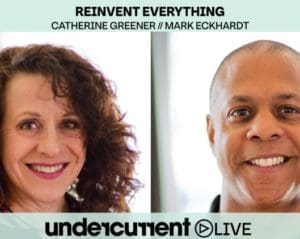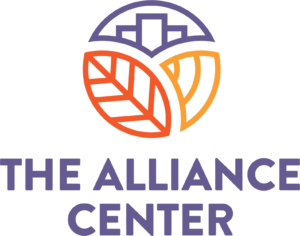Green Alpha’s COO, Betsy Moszeter, and Catherine Greener work together on the Board of Directors for The Alliance Center. As they work together to further the organization’s mission and provide governance oversight of the multi-faceted nonprofit, the two women thoroughly enjoy discovering all the things they have in common, and learning how they can each benefit from the other’s expertise. (They might even have gotten caught giggling together in more than one Board meeting)
Please read a summary of a fun, recent conversation between Catherine and Betsy.
Betsy: I’ve been so impressed by the breadth of your sustainability knowledge – from how diesel-powered cruise ships run to how National Parks can improve their garbage and recycling programs. Can you tell us about a favorite project of yours?
Catherine: Thank you, Betsy! Picking a favorite project is a lot like picking a favorite ice cream…that is a hard question! Having said that, I can’t help but think fondly a few years back to working with an amazing team in Tennessee, implementing sustainability employee engagement programs at Nissan North America. What I loved about the project was how engaging teams on the shop floor delivered both operational efficiencies and cost reductions while capturing the passion, enthusiasm and ideas of the team members. I will never forget the enthusiasm and dedication of Nissan’s Green Teams. The spirit of the woman who led the work, Sherri Gentry, will forever be a guiding light in my life. Sherri, before she retired from Nissan was the program manager and was able to be the champion of their zero waste efforts.
The reason this was one of my favorite projects was the spirit of everyone working towards their zero waste goals. They started every initiative with “What If?” and found ways to make the impossible possible. That really is the key to sustainability projects—intervening in the system in ways that go beyond making things less bad and finding ways to make the world a better place.
Betsy: I see that you recently joined a collaboration of subject matter experts, Undercurrent. Can you describe the work you are doing?
Catherine: Undercurrent is a collaboration of powerhouse consultants who’ve come together to catalyze the changes needed in organizations to create a regenerative future. We collectively have hundreds of years of experience (eeek!) in change management and design. We work across companies of all sizes leveraging a vast range of domain expertise and skill sets, sharing a deep passion for creating the future we want for generations to come. Because of our diverse and unique backgrounds, we are able to work with organizations to develop solutions that are pragmatic and economically viable. The combination of the technical and creative talent in Undercurrent provides the ability to assist organizations with implementing projects that bridge the world before COVID, to a regenerative future, all while creating stories and messaging that inspire others.
Betsy: We have a lot of mutual friends, which isn’t surprising given everything we have in common. You have been working on a body of work, called ReInventing Everything, in collaboration with our friend Hunter Lovins. Please tell us more about that.
Catherine: Hunter and I started collaborating together in 2001 when I left ABB in Detroit and joined Rocky Mountain Institute as the Commercial and Industrial Team Leader. It was my first position in sustainability. Previously I had been working in Lean Manufacturing and Total Quality Management (TQM). I saw an opportunity to extrapolate many of the principles and tools into the emerging field of sustainability. I bring that perspective to all of my work, and it has led me to ReInventing Everything.
Hunter and several collaborators recently published a book, A Finer Future, which provides a positive vision of the future and describes the tools that will get us there. ReInventing Everything is a complimentary body of work that gives organizations the path to create the Finer Future. ReInventing Everything is a pragmatic system of solutions for creating better organizations, better products and better communities.
Sustainability is a challenging word—in financial terms it often meant stability, stay the same, and is very difficult to define. We do know that we do not live in a truly sustainability world and that we are running of out of time. What is sustainability? When a concept is complex, it is often easier to define it from its inverse: what it is not. If you struggle to define sustainability (and almost everyone does) then define unsustainability. That’s easier: we’re in it. By viewing the unsustainable in the current world, flaws, unintended consequences, inequities, waste and hidden costs become very clear. Seeing this enables us to get clarity on what must be done.
After understanding the unsustainable, ReInventing Everything creates a shared vision of a positive future, a Posivision. This would be a future of full and right employment. Waste streams will no longer clog our waterways or oceans and fill our fish and fauna (and ourselves) with debris, but become the feedstocks of innovation. Clean, distributed, energy will provide security and skies free of toxic pollution. Agriculture will store carbon while providing nutrients; grasslands return to habitats; ecosystems regain their beauty and integrity. As the vision takes form, there is a clear path and a plan can be made. The plan to close the gap between today’s reality and the shared Posivision starts with deep resource efficiency. Eliminating the waste buys time and frees up operating expenses. Companies that are successfully ReInventing Everything are designing in resilience by redeploying waste streams, closing loops by owning the end-of-life, by ceasing reliance on non-renewable energy and materials, designing for recyclability, assisting their supply chain with regenerative agriculture practices, simplifying logistics, investing in community infrastructure and restoring biodiversity.
Betsy: You have spent a great deal of your career being a bit of a maverick as a female leader and executive – from being an engineer, starting your career as a maintenance supervisor at Pontiac Motors, to working at ABB in quality. As one of the few women in asset management and one that became a c-suite executive at a young age, I can relate! I don’t excel at following completely illogical rules set by society-at-large (usually meaning old white guys who set the rules decades, or longer, ago).
Increasing diversity of any team can be a powerful driver of materially increased performance. What advice do you have for companies that want to increase female leadership and/or diversity of their teams?
Catherine: When I started my career, women wore suits with ties and there was a dress code where no cleavage, including toe cleavage, was allowed. The message was loud and clear, be like your male counterparts, just the female version. Over the decades, and thankfully the elimination of many dress codes, I have learned that what really counts is to be authentically who you are, independent of your gender. Women process information differently, we communicate differently, gesticulate more and have the ability, generally, to foster more community and think in systems. Better leadership is really not gender dependent; it is not being female or male that makes for great leadership. From my experience it is the traits and skills a leader brings. Those skills can at the top of an organization, especially as we move to a world post-COVID will be very important.
I strongly believe that diversity is very important to a successful organization. Nature provides us many examples of the effectiveness of biodiversity. A diverse team is more resilient, bringing wider ranges of thought and solutions to complex problems. We need to think differently as we face not only this crisis, but the reinvention of everything.
Betsy: When I was approached to consider joining the Board of Directors for The Alliance Center, I was a quick “yes” for a few reasons, including the fact that The Alliance Center’s mission is so close to Green Alpha’s. We’re all trying to create, catalyze, and accelerate innovative solutions to our greatest system-level risks. What drew you to The Alliance Center?
Catherine: I was drawn to The Alliance Center’s commitment to convening individuals from across many spectrums to solve the climate and environmental crises through system intervention. I was also drawn to the desire to demonstrate, through collaboration and pilot projects that the impossible can be possible. Projects such as their Zero Waste commitment and the DC micro-grid are just two examples of the demonstration efforts. Additionally, by focusing on local, that is Colorado, The Alliance Center can demonstrate successful results and be a learning lab for communities around the world.
Betsy: During this time of quarantine and stay-at-home recommendations, a lot of people are looking for great book or other forms of self-improvement recommendations. Personally, I’m spending an hour every evening alternating between learning Yoruba, Nigerian Pidgin, and French, before settling into a relaxing non-fiction book (this week it’s The Power by Naomi Alderman). What books or other activities do you recommend?
Catherine: I have a stack of books about 3-feet tall now next to my nightstand! I think it’s really important now to be kind to ourselves—to slow down and take inventory of what we are grateful for, and to honor the range of emotions that flow daily. We are all grieving in one form or another—for the lifestyle we had, the ease of life, and what we considered normal. However, “normal” had significant negative consequences that often were not noticed. Many of us were moving so fast that our souls did not have a chance to catch up. We were racing around, being chased by the constant din of our electronic devices. In this inflection point/wormhole in time, we have a chance to re-calibrate and reset what is really important.
I recommend motion – any kind that keeps you in-tune to the natural cycles happening around us and your own circadian rhythm. Walking or running, yoga, hiking usually only a good pair of shoes and the clothes you already have. I have seen so many new things in the neighborhood I have lived in for 13 years just by taking a 30 minute walk every day.
As for books, I too mix it up between non-fiction and fiction. Here are some of the books that I highly recommend:
- The Boy Who Harnessed the Wind: Creating Currents of Electricity and Hope: A great story of determination, tenacity, hope, creativity and overcoming adversity
- Beneath a Scarlet Sky: Set in Northern Italy at the end of WWII, based on a true story of courage, resistance and grit
Two books I am reading right now are:
- Active Hope: How to Face the Mess We’re in without Going Crazy – the title really says it all
- The Heart’s Invisible Furies – A story about a man’s life in Ireland, from the 1940’s until today and his quest for identity and belonging
Betsy: One thing I love about Boulder is the hiking – it’s a key reason I moved here. However, I’ve found that the short growing season and early evening shadow cast on us from the sun setting on the other side of the Rockies really puts a damper on my gardening. What do you love and possibly find difficult about the area?
Catherine: I absolutely love just about anything outdoors. Most days I ascribe to the saying, “there is no such thing as bad weather, just bad clothes.” In Colorado, we are blessed with incredible access to nature, sunshine and vistas. I have been walking and hiking more since the COVID orders have been issued. I enjoy biking and had been skiing up to March 13th. I don’t know if there is anything that I would find difficult here, but I would want to underscore that living in a high desert comes with a deep respect for water. Growing up in the Midwest, we didn’t really think too much about water except when there was too much of it. Here in Colorado, we have a limited amount of water and need to treat it as the precious resource that it is.

###
Important disclosures: https://greenalphaadvisors.com/about-us/legal-disclaimers/



